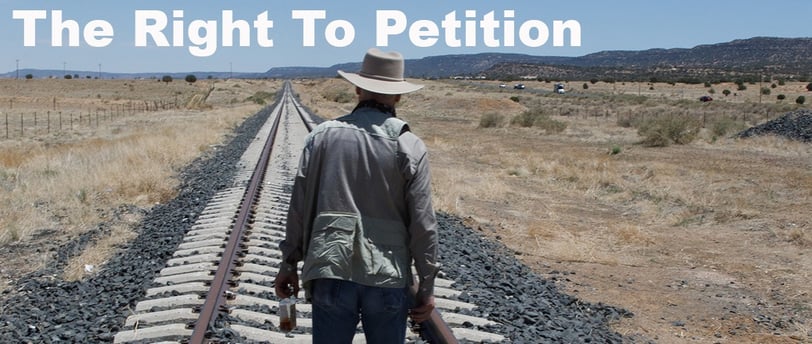Our First Amendment Right to Petition the Government
Our right to petition the government has been taken by lobbyists. It hasn't always been that way, and it can change.
POLITICALLETTERS TO THE EDITOR
2/6/20253 min read


The Forgotten Clause of the First Amendment
According to the First Amendment of the U.S. Constitution, citizens have the right to "petition the Government for a redress of grievances." This means we have the right to submit petitions to our elected representatives in Congress. This right has largely faded from public consciousness.
Congress is violating its constitutional responsibility to recognize properly presented petitions. This Constitutional guarantee has been largely handed over to highly paid lobbyists. This has set a troubling precedent between citizens and their elected representatives. An effective democracy relies on accountability, and when petitions are ignored, it erodes public trust in government.
It is true that even if Congress recognized our right to petition, they would not be required to act on them, but recognizing their responsibility to accept our petitions would at least allow them to be entered into the Congressional record.
So? What is the freedom to petition?
Testifying or speaking at a public meeting at any level of government, including to members of Congress and the president.
Written complaints or requests for a change to a government agency.
Communications, electronic or otherwise, giving feedback to our representatives.
Personal meetings with government officials.
Political petitions. These include nominating petitions filed by political candidates to get on a ballot, petitions to recall elected officials, and petitions for voting proposals. Signers typically must be U.S. citizens, registered to vote, and live in the election district addressed by the petition.
Legal petitions asking a court to issue a specific order. Usually filed by a lawyer involved in a specific case or lawsuit.
Public purpose petitions asking officials to take or not take a specific action. Signers generally only have to establish their identity.
Internet petitions
For almost 150 years,
There was a formal process in Congress for receiving petitions. We were afforded due process in a way that we do not receive today. It has been so long since our rights were recognized that we have entirely forgotten the importance of the Petition Clause.
These rights are not without limits. The government may require valid signatures on a written or online petition. It can set general rules for how petitions are gathered and submitted. However, those requirements can not be intended to discourage people. In the early 1800s, Congress was buried in petitions seeking to end slavery. House leaders responded by enacting rules stating that the House would no longer accept petitions on slavery. Those rules were declared unconstitutional in 1844.
So, was it really that important?
For most of our history, women couldn't vote, in most states, women couldn't sign contracts or other legal documents. A petition was circulated supporting women's suffrage in 1848, by 1878, Congress had received petitions from more than 30,000 women. The petitioning continued until the 19th Amendment, ensuring women's right to vote, was ratified in 1921.
As recently as 1985, the Supreme Court case of McDonald v. Smith, Chief Justice Warren Burger stated, "Petition is cut from the same cloth as the other guarantees of (the First) Amendment and is an assurance of a particular freedom of expression."
By closing itself to petitions and shutting down the formal process that existed until the 1920s, Congress has supported a lobbying system that is no more than a black market for access. With no meaningful lobbying regulation, our current lobbying system, disguised as the modern version of the petition process—violates our right to petition and fails to uphold our First Amendment Petition Clause rights. We need a reformed lobbying system that offers us a more formal, public, and equal means of access.
It may be hard to believe,
but these lobbyists and the changes they have helped Congress make to the petitioning process, which have diluted our right to petition, have not been litigated. This means that the constitutionality of the current system has never been decided.
Perhaps it should, before it is too late.
